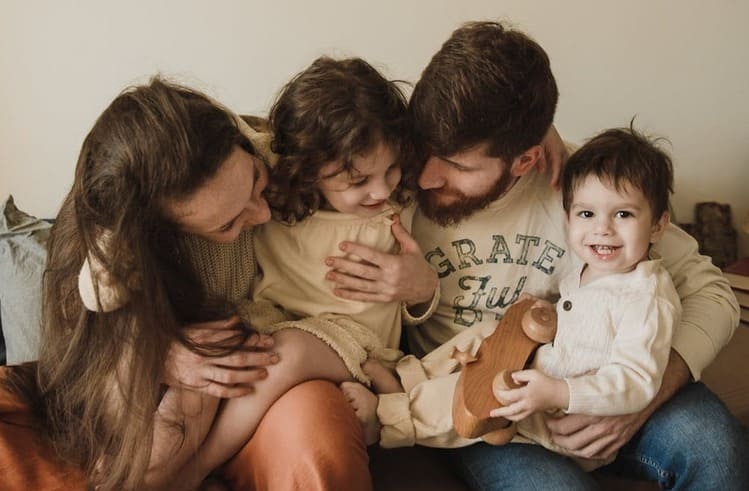Mindful and empathetic parenting means being fully present with your child, tuning into their feelings without judgment and responding with compassion rather than reaction. It is about connection over correction, choosing to understand why a child acts a certain way instead of simply trying to stop the behavior.
In a world where screens, schedules and societal pressures often pull families apart, this parenting style offers a grounding path. It helps parents and children feel seen, heard and valued, creating emotional safety that supports healthy development and lifelong resilience.
Learn more about balancing work and family life and healthy digital habits to create a more mindful family environment.
Mindful and Empathetic Parenting: Core Principles and Pillars

Non-Judgmental Awareness
Mindfulness begins with observing your child is behavior and your own reactions without labeling them “good” or “bad.” This awareness creates space to respond thoughtfully rather than impulsively.
Emotional Attunement and Empathy
Empathy means tuning in to your child is emotional experience; recognizing their feelings and validating them, even if you do not agree with their actions. This attunement builds trust and emotional intelligence. For more on building strong emotional connections, explore our guide on parent-child bonding.
Regulating Your Own Nervous System
Children often mirror their parents’ emotional states. By practicing mindfulness and calming techniques, you regulate your nervous system, which helps you stay patient and grounded during challenging moments.
Setting Boundaries with Love and Clarity
Empathy does not mean permissiveness. Clear, consistent boundaries delivered with warmth teach children safety and respect, helping them understand limits without fear or shame.
Mindful and Empathetic Parenting: Practical Strategies
Mindful Moments: Breathing, Pausing, Noticing
Before responding to a meltdown or frustration, take a deep breath and pause. Notice your child is emotions and your own bodily sensations. This brief mindfulness break can prevent reactive responses.
It sounds like you are frustrated. I am here to help.
This statement show your child that their feelings matter and are understood.
Creative Ways to Connect During Stressful Moments
- Get down to their eye level and offer a comforting touch.
- Use playful distraction like a silly face or a shared deep breath.
- Encourage drawing or storytelling to express feelings.
Turning Tantrums Into Teachable Moments
Instead of punishing tantrums, view them as your child is way of communicating overwhelming emotions. Help them name their feelings:
It looks like you are feeling angry. Let us take some deep breaths together.
Read more about Temper Tantrums: Managing Your Child’s Emotional Outbursts
Mindful and Empathetic Parenting: Building Resilience
The Power of Mindful Discipline
Mindful discipline means responding to misbehavior with understanding and empathy, rather than punishment. It is about helping children learn from their mistakes and grow into responsible, compassionate adults.
Benefits for Both Parent and Child
Research has shown that mindful parenting practices can have significant benefits for both parents and children:
- Builds Emotional Safety and Trust: Children feel secure knowing their feelings are accepted.
- Supports Better Communication and Fewer Power Struggles: Empathy invites cooperation rather than rebellion.
- Encourages Emotional Resilience: Kids learn to manage their emotions effectively, preparing them for life’s challenges.
Frequently Asked Questions (FAQs)
1. Is mindful parenting the same as gentle parenting?
Not exactly. While they overlap, mindful parenting emphasizes present-moment awareness and emotional regulation. Gentle parenting focuses on discipline without punishment. Mindfulness influences how you parent; whether gently or otherwise.
2. Can I be a mindful parent if I sometimes lose my temper?
Yes! Mindful parenting is not about perfection; it is about noticing when you are triggered, taking responsibility and repairing the connection.
3. What if my child does not respond to empathy?
Children do not always show instant results. Empathy is not about control; it is about connection. Over time, it builds a safe foundation that encourages cooperation.
4. Does empathetic parenting mean never saying “no”?
Not at all. You can set firm boundaries with empathy. It is not what you say, but how you say it that makes the difference.
5. How do I teach empathy if I did not grow up with it?
You start with yourself. Practicing self-empathy and mindful awareness can rewire your emotional patterns; and your child learns by watching you.
Age-Specific Mindful Parenting Strategies

Toddlers (1-3 years)
- Use simple language to name emotions: “You are feeling sad because your toy broke.”
- Practice “mindful moments” during daily routines like diaper changes or meals.
- Model calm breathing during tantrums.
Preschoolers (3-5 years)
- Introduce basic mindfulness exercises like “belly breathing.”
- Use emotion cards or books to help identify feelings.
- Create a “calm corner” for emotional regulation.
School-Age Children (6-12 years)
- Practice mindful listening during conversations.
- Introduce guided meditation or body scans.
- Use “mindful check-ins” before homework or bedtime.
Daily Mindfulness Practices for Parents
Morning Routine
- Take 5 deep breaths before getting out of bed
- Practice mindful showering or tooth-brushing
- Set an intention for the day
During the Day
- Pause before responding to challenging behavior
- Practice mindful walking between activities
- Take “mindful moments” during transitions
Evening Routine
- Reflect on three positive moments from the day
- Practice gratitude with your child
- End the day with a mindful bedtime routine

Mindful and Empathetic Parenting: Final Thoughts
Mindful parenting is a practice of connection, patience and growth, for both you and your child. It invites you to slow down, listen deeply and respond with kindness. While it requires practice and self-awareness, the rewards are profound: a relationship rooted in trust, emotional safety and mutual respect that will support your child’s well-being for life.
Remember, every small mindful moment counts. Start today by simply noticing your child’s feelings and your own, and watch how your parenting transforms.